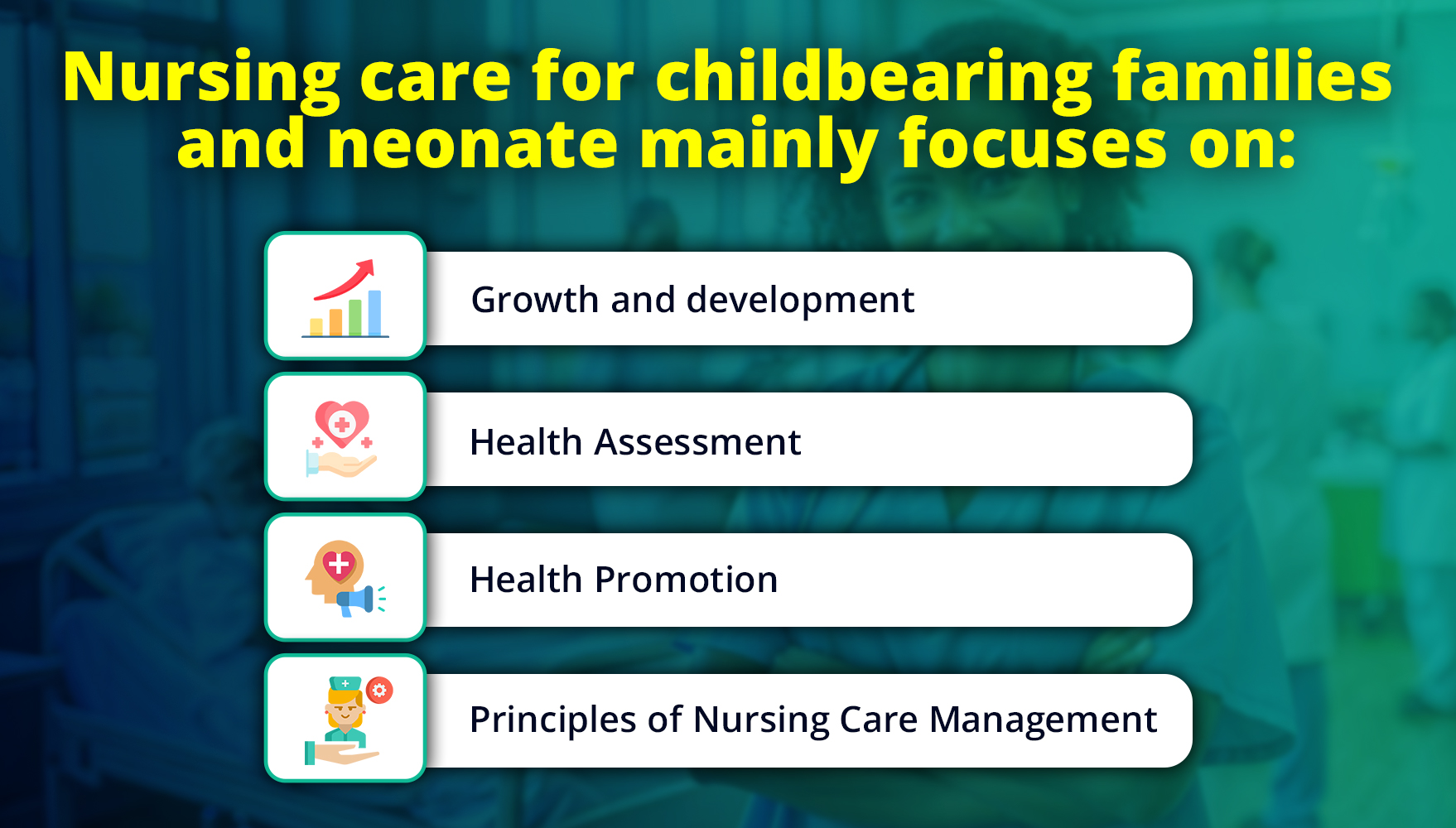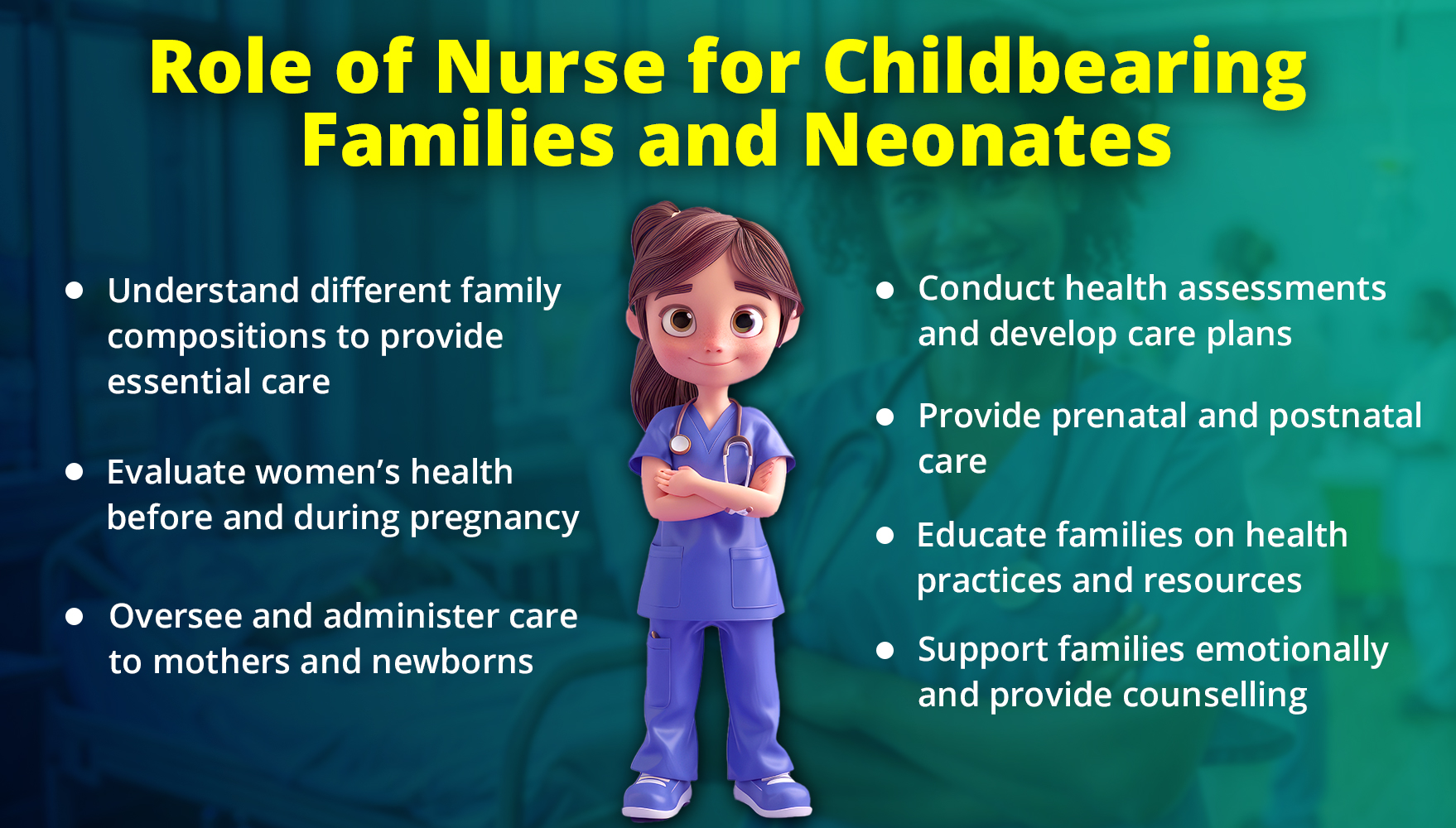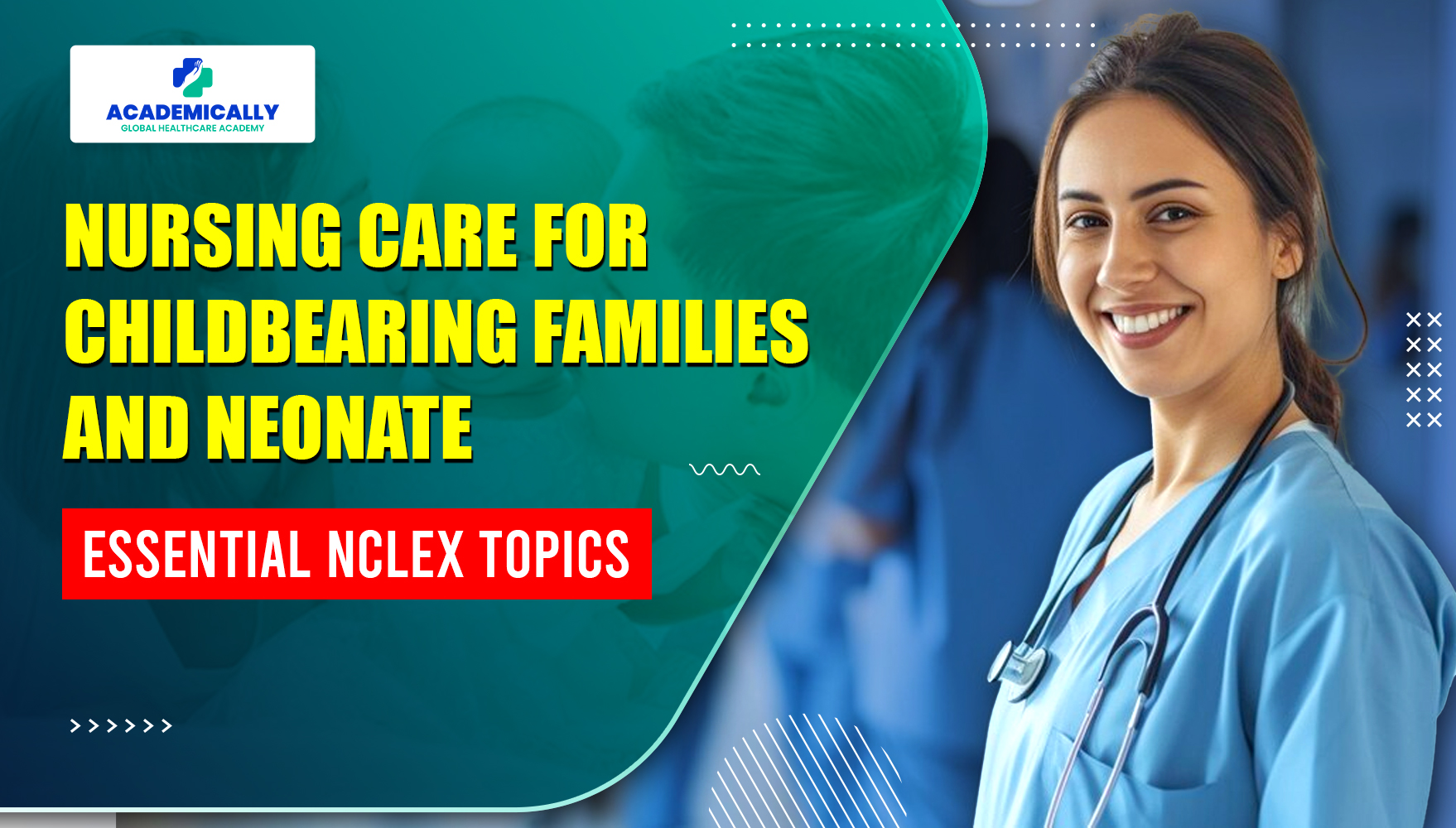The main topics under the nursing care of the childbearing family and neonate are:

Growth and Development
Growth and development concern the woman before conception and the childbearing family. Nurses should understand the types of family compositions and care for their needs accordingly.
Family growth and development: Family can be described narrowly as individuals who live together or, more broadly, as a group of people who share bonds, emotions, and societal tasks.
Types of Family Compositions
- Dyad family: Consists of two individuals sharing a living space.
- Nuclear family: Includes a man, a woman, and their children. This structure makes up about 50% of families today, a decline from the past. Strong bonds and cohesion in nuclear families contribute to a healthy society.
- Extended family: Comprises the nuclear family and additional relatives like grandparents, aunts, and uncles. There's an increasing trend of adult children and elderly parents living together.
- Single-parent family: Consists of one adult raising children, often due to divorce or single parenthood. Common challenges include poverty and lack of support during conflicts.
- Communal family: A group of individuals living together based on shared values, similar to communes from the 1960s.
- Gay or lesbian families: Adults of the same gender living together based on sexual orientation, companionship, love, or financial security.
- Foster or adoptive families: Adults who bring non-biological children into their home to raise temporarily or until adulthood.
- Blended family: Adults with children from previous marriages living together, combining all children from their previous relationships.
Health Assessment
The health of the woman and the family dynamics change during pregnancy, and the nurse must assess these changes to develop a care plan with the client and family.
Assessment
- Pre-pregnancy assessment: Evaluate the woman's health status before pregnancy.
- Family and assessment: Examine the family structure, development, and function as a unit and individual members. Assess their health status within their cultural, religious, and societal roles.
Analysis
- Risk for injury: Due to a lack of knowledge about potential problems.
- Interrupted family processes: Due to inaccessible health care, financial constraints, and inability to provide care.
- Ineffective health maintenance: Lack of knowledge, access issues, and conflicts with personal or cultural values can lead to poor and ignorance of the health needs.
- Impaired parenting: Related to lack of knowledge about family needs, development, and resource access.
Planning
- Family and Individual assessment: Conduct thorough evaluations.
- Care plan development: Create a care plan addressing the needs from both nursing and family perspectives.
- Evaluation of care plan: Continuously evaluate and adjust the care plan.
Implementation
Adaptation assistance: Help the family adapt to pregnancy-related changes.
Referrals: Direct the client and family to necessary health care resources.
Prenatal care: Ensure the client receives proper prenatal care.
Evaluation
- Family development: Ensure family development continues despite any illness or dysfunction.
- Health understanding: Confirm the family understands health problems and caregiving needs.
- Health care access: Ensure the family knows how to find and access services.
- Behavioural changes: Facilitate individual behaviour changes that lead to healthy outcomes.
- Satisfaction with health: Ensure family satisfaction with the health of its members.
Health Promotion
Health promotion for a pregnant woman involves maintaining a healthy lifestyle before pregnancy, making informed family planning choices, and adapting to pregnancy changes.
Preconception Care
Medical condition assessment: Identify and treat existing or potential medical conditions, including medication and drug use, reproductive history, and genetic concerns.
Healthy habits development: Encourage rest, stress reduction, positive environments, and elimination of harmful habits (smoking, drugs, alcohol). Maintain up-to-date immunisations, develop a nutrition plan, and ensure adequate exercise.
Health care providers: Identify supportive perinatal health care providers.
Psychological Preparation: Prepare the client for changes in family composition and responsibilities.
Genetic counselling: Initiate if medically indicated.
Nursing Process
Assessment:
- Complete health history and physical examination.
- Assess birth control needs, prior use, and influencing factors.
Analysis:
- Deficient knowledge of birth control options.
- Interrupted family processes due to differing opinions on birth control.
Planning:
- Provide education and demonstrations.
- Discuss the availability of healthcare providers.
Implementation:
- Analyse health history for contraindications.
- Educate on menstrual cycle and contraceptive use.
- Demonstrate methods and discuss potential complications.
Evaluation:
- Ensure the client understands the effects, side effects, and correct use of contraceptives.
- Verify consistent use and satisfaction with the chosen method.
Principles of Nursing Care Management
Background Information on Trends in Maternal/Infant/Family Care
- Family structure: Over 50% of households have a single parent.
- Working mothers: The number of mothers working outside the home is increasing.
- Abuse: Incidents of abuse are rising and include more than just physical maltreatment.
- Mobility: Families are becoming more mobile.
- Family size: Families are having fewer children than in previous decades.
- Infant mortality: While childbearing-related deaths are decreasing, the U.S. still has the highest infant mortality rates among developed countries.
- Preterm delivery: The leading cause of infant mortality is preterm delivery.
- Foetal alcohol syndrome: The leading cause of mental retardation in the U.S. and is entirely preventable.
Role of the Nurse
Care coordination: Facilitate access to care and act as a liaison among various agencies.
Care implementation and supervision: Oversee and administer care to family members.
Healthcare navigation: Assist clients in navigating the healthcare system.
Family-centred care: Ensure that care is centred around the family and meets the needs of the majority.
Advocacy: Advocate, clarify, and interpret information for the infant and family.
Education: Educate clients formally and informally and take on a research role.
Continuous care: Ensure healthcare, particularly perinatal care, is continuous rather than episodic.
Counselling: Provide counselling to clients.

Nursing Care Standards
Safety and Infection Control: Document, report, and follow up on abuse of partners and neonates.
Client Rights:
- Provide information on pregnant patient rights and responsibilities.
- Facilitate access to care for all pregnant clients.
- Advocate for evidence-based maternity and neonatal care research.
- Arrange and advocate for flexible appointment times.
- Emphasise health promotion and disease prevention.
- Lobby for healthcare access for all clients.
- Consider the family as a unit within a community when developing care plans.
Standards of Care:
- Implement standards of care as per the Nurse Practice Act.
- Advocate for a national health care database for healthcare records access.
- Anticipate ethical dilemmas in childbearing settings.
- Follow standards of care set by organisations like the Association of Women’s Health, Obstetric and Neonatal Nurses.
- Stay updated on ethical decision-making trends and compare them with current practices.
Ethical and Legal Considerations
- Parents are the primary decision-makers for their infants.
- To support decision-making, healthcare providers must fully inform parents about risks, benefits, outcomes, and current status.
- Influences on decision-making in obstetric/neonatal settings include ethics, law, spirituality, culture, gender perspectives, and family and healthcare provider viewpoints.
- Key clinical issues and dilemmas:
- The U.S. is the only developed country without guaranteed access to maternity care.
- The foetus/neonate, as a second client, cannot consent to medical procedures.
- Children can sue for wrongful treatment upon reaching the legal age of 21.
- Hospital stays are shorter than before.
- Families are increasingly seeking alternatives to hospital births, and more acute care is happening at home.
- Assisted reproductive technology is expanding access for clients unable to bear children.
- Decisions regarding childbirth or pregnancy termination require careful consideration.
- Prenatal testing, diagnosis, and genetic counselling are becoming more common.
- Clinical decisions include the duration of resuscitation efforts, pain management for non-responsive patients, neonatal intensive care transfers, use of foetal tissue for research, and determining neonatal quality of life.

Final Words
Nursing care for the childbearing family and neonate is integral to promoting healthy families and ensuring the safety and well-being of mothers and newborns.
This topic is essential for the NCLEX-RN exam, which tests a nurse’s ability to provide effective and compassionate care. Nurses can support families throughout the pregnancy and newborn by understanding family structures, conducting thorough health assessments, and creating effective care plans. Staying informed about ethical and legal issues helps nurses deliver high-quality, family-centred care.
If you want more detailed lecture notes and more, join Academically’s NCLEX Preparation Course.
Please fill out this form to get one-on-one counselling with one of our experts. Get all your doubts cleared and make your way to your dream career.
Fill up this form for a free one on one counselling session.





